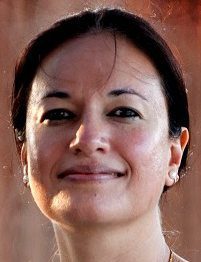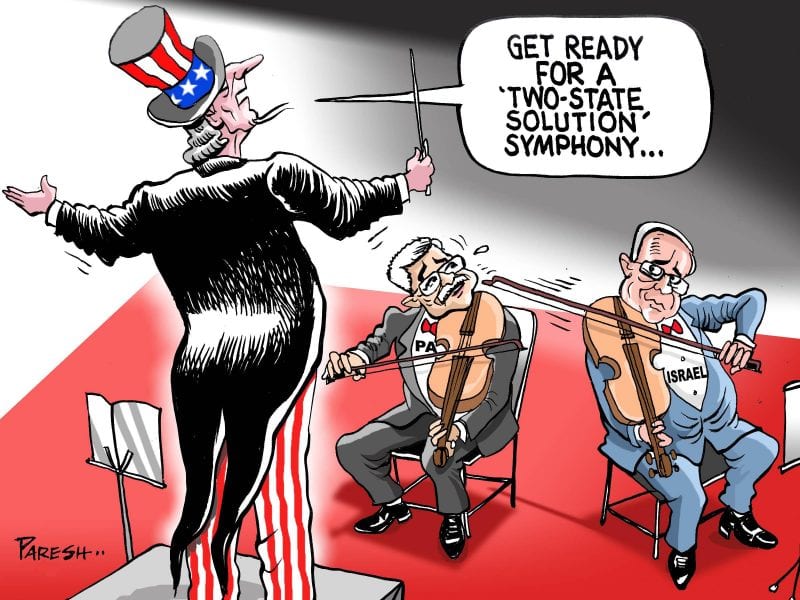BY NYLA ALI KHAN
 On Sunday I decided to push myself to step out of my comfort zone even more than I usually do. So I made the effort to go to Temple B’nai Israel in order to engage with the multireligious and mutilracial group of 22 Oklahomans who traveled to a tumultuous part of the world, Israel and the Palestinian territories to explore the intricacies and complexity of the seemingly unending conflict. The Israel-Palestine conflict has made people on both sides of the divide despondent, bitter, resentful, and suspicious of one another. But Sunday, all I heard from people of the three Abrahamic traditions – Jews, Christians, and Muslims – was the emphasis on humanity, restoration of dignity, human rights, and the revivification of democracy, which would enable the two sides to build bridges across religious, political, and ideological divides.
On Sunday I decided to push myself to step out of my comfort zone even more than I usually do. So I made the effort to go to Temple B’nai Israel in order to engage with the multireligious and mutilracial group of 22 Oklahomans who traveled to a tumultuous part of the world, Israel and the Palestinian territories to explore the intricacies and complexity of the seemingly unending conflict. The Israel-Palestine conflict has made people on both sides of the divide despondent, bitter, resentful, and suspicious of one another. But Sunday, all I heard from people of the three Abrahamic traditions – Jews, Christians, and Muslims – was the emphasis on humanity, restoration of dignity, human rights, and the revivification of democracy, which would enable the two sides to build bridges across religious, political, and ideological divides.
One of the first travelers I talked with was Michael Korenblit, president of the Respect Diversity Foundation. Instead of a casual conversation or debate, I asked Michael two specific questions to which he responded eloquently. The first question I posed was, given the increasing polarization in today’s global world, is it possible to stop demonizing the “other” against whom the “self” is defined?
My interviewee observed, “Yes, but it will take a lot of work and leaders willing to step out of their comfort zone. One of the best ways is to go and meet with the ‘other.’ Go to a mosque for prayers, go to a Catholic mass, go to a black church and participate in the services. Go to a Temple or Synagogue on a Friday night and experience a Shabbat service. Go to a Hindu, Buddhist, or Baha’i service and experience an American Indian spiritual ceremony and after each encounter, talk to the people. Talk to an Agnostic and an Atheist and ask them questions and share your own feelings. Talk to a refugee and an undocumented person. Ask each about their hopes and dreams, especially for their children. You will find that their concerns are the same as yours. Once you get to know the ‘other’ as a human being, the less likely you will be to demonize an entire group of people.”
And then I asked him a question that I often ask myself in the context of the conflict in my homeland: Is Radical Forgiveness a possibility to mitigate the current conflict?
Michael thoughtfully responded, “I don’t know about Radical Forgiveness, other than what happened in South Carolina. This is where survivors and family members of those murdered in the Emanuel African Methodist Episcopal Church forgave the murderer for what he did. I would consider this Radical Forgiveness. Whether that forgiveness will stop other shootings is not clear. This last year, another individual [who was stopped before it happened] was planning a copy-cat shooting. This time, it was going to be Jewish people in a Synagogue.
“In Israel, there are over 600 members of an organization called The Parents’ Circle. They are all Jews and Muslims who have lost children in the conflict. They have come together to speak out against the violence. They speak at schools in both Israel and Palestine, as well as to adult groups. They insist that this violence and killing must stop. They believe in moving forward and to work for peace, so that no more children will die. I don’t know if any have forgiven the perpetrators, but I do know that what they are doing is saying, ‘We must find a better way.’”
He went on to tell me about the “Conspiracy of Good,” which he considers a powerful example of the ability to heal and repair divides:
“There is a city in Southern France called Le Chambon-Sur-Lignon. From 1940-44, the village of 5,000 Huguenot [Calvinist] Protestants, and the surrounding villages and towns, made a conscious decision to defy both the Vichy government of France, and the Nazis by refusing to turn over Jews. Over 5,000 refugees escaped to the city. Of which over 3,500 were Jews. Working together, they helped over 5,000 people escape the Nazis, by moving them around in their own city and the surrounding villages and towns. This meant that some 30,000 people were working together to defy the Nazis and save human life. After the war, when the world heard about what had been done, some called it ‘The Conspiracy of Good.’”
I would observe that if the political evolution of a society is nipped in the bud by a belligerent military establishment, state policies always fall short of becoming coherent. The more the military establishment makes incursions into democratic spaces, the more shaky institutions of state remain and the more fragmented the polity becomes. Once a populace begins to question the validity of the choices it exercises in the electoral process because processes of electioneering and institutions of democratic governance lack transparency, the sociopolitical fabric is ripped to pieces.
Another traveler, William Gorden, whom I particularly enjoyed meeting, said that his main message in answering my question about the complexity of the resolvability of the Israel-Palestine conflict was that, “The one state solution is unworkable in that the demographics will not allow it to work. Palestinian population rates will soon exceed Israeli rates, and might render democracy to be untenable. The way this might work would be for the Israeli state to have the equivalent of the U.S. Bill of Rights, so that whoever is in the minority will be protected. This has made our democracy workable. The Israeli state has no document which does this, providing for Due Process. Consequently a Two-State option has to be considered likely. That time, as well, may be passing or past.”
The Rev. Dr. William Tabbernee of Oklahoma Conference of Churches had a postcolonial reading of the conflict, which I, giving my training in Postcolonial Literature and theory, grasped the minute he brought it up. The reverend was particularly passionate about much neglected issue of social justice in the Palestinian territories and Israel:
“Given the holocaust, everything that Jews have suffered during the past 2,000 years, and the recent rise in anti-Semitism, a Jewish State is not only necessary but makes sense. Israel has the right to exist and to have international support. At the same time it is important for us to insist that Israel treat Palestinians [Christians as well as Muslims] equitably and with dignity.
“Social justice for Israelis and Palestinians must apply in the fair distribution of natural and other resources both now and as part of whatever ‘solution’ is ultimately implemented to secure peace.
“The issue of ‘democracy’ must also be resolved in a way which safeguards national security for Israel as a Jewish state and avoids Palestinians living as ‘second-class citizens.’ A first step toward this may well be a public form of ‘mutual forgiveness’ for the acts of violence which have been perpetrated by both sides and a binding pledge to work together to establish peaceful coexistence in the land which all three Abrahamic Traditions consider ‘Holy.’”
My conversations with these well-meaning individuals led me to conclude that instead of deterring the growth of democracy, the goal should be to empower the populace of both Israel and Palestine sufficiently to induce satisfaction with their role within current geopolitical realities such that a dis-empowered populace does not succumb to ministrations of destructive political ideologies. In addition to addressing the political aspect of democracy, it is important to take cognizance of its economic aspect as well.
The identity of a state or a nation cannot be built on unquenchable hate and certainly not on cashing in on the pain and grief of other people. It is or, at least, should be inconceivable, in the day and age of a global economy, to spurn the concepts of reason, rationality, and political and moral ethics.
How can we, as global citizens, develop the ability to organize and mobilize for social change, which requires the creation of awareness not just at the individual level but at the collective level as well?
– Nyla Ali Khan is the author of Fiction of Nationality in an Era of Transnationalism, Islam, Women, and Violence in Kashmir, The Life of a Kashmiri Woman,and the editor of The Parchment of Kashmir. Nyla Ali Khan has also served as a guest editor working on articles from the Jammu and Kashmir region for Oxford University Press [New York], helping to identify, commission, and review articles. She can be reached at nylakhan@aol.com.







